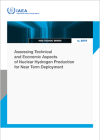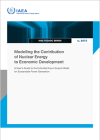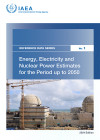Economic analysis is essential to determine the feasibility of any energy project, including one that involves nuclear power plants. Its main objective is to help create and select projects that will contribute to the welfare of society.
Economics
The economic aspects of energy are complex, particularly for developing nations. It is not evident how investments in the energy sector will facilitate achievement of the sustainable development goals such as health care, education, increasing employment and participating in international markets.
In many cases, the first challenge is to attract and arrange investment for energy infrastructure projects . Few developing nations have the resources required to finance the needed development. Over the past decades, it has become clear that transforming centrally controlled energy systems into liberalized markets can create the right conditions to direct investment and facilitate competition.
To ensure the affordability of services, energy must also be priced appropriately to cover the full cost of supply, yet access to it should not be limited. Pricing adjustments may be necessary to ensure that all consumers can afford to realize the benefits of energy. In the commercial sectors, energy pricing directly influences the competitiveness of goods and services, both locally and internationally.
Economic analysis is a systematic analysis approach to determine the optimal allocation of resources. It involves the comparison of two or more alternatives in achieving a specific objective under a given set of assumptions and constraints. The cost-benefit analysis compares project economic costs with project economic benefits. It should take into account the opportunity costs of the resources employed and attempt to measure, in monetary terms, the private and social costs and benefits of a project to a society or an economy. The analysis should evaluate the economic feasibility of a nuclear power project and compare its economics to other (mutually exclusive) alternatives.
The IAEA helps strengthen Member States' capacities to use energy and nuclear power planning tools to conduct studies for energy system and electricity supply options. These economic analysis tools can help answer various questions about an energy project’s impact on the entity undertaking the project, on society and on various stakeholders, and about the project’s risks and sustainability.
IAEA’s Planning and Economic Studies Section tools can improve Member States' understanding of nuclear technology's compatibility with national sustainable development objectives and its possible contributions to socioeconomic development, climate protection and energy security. In addition, the Nuclear Economics Support Tool is provided by the IAEA to assist in economic analysis of nuclear energy systems.









